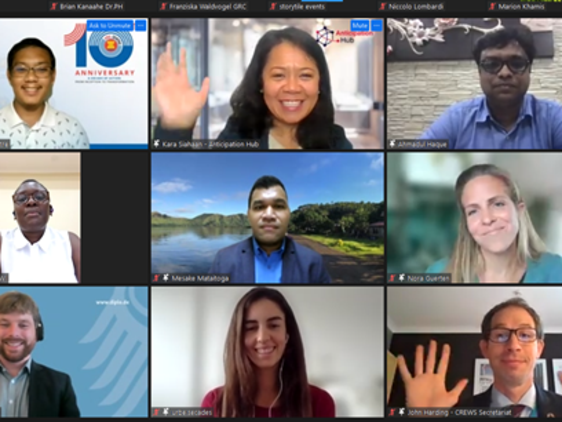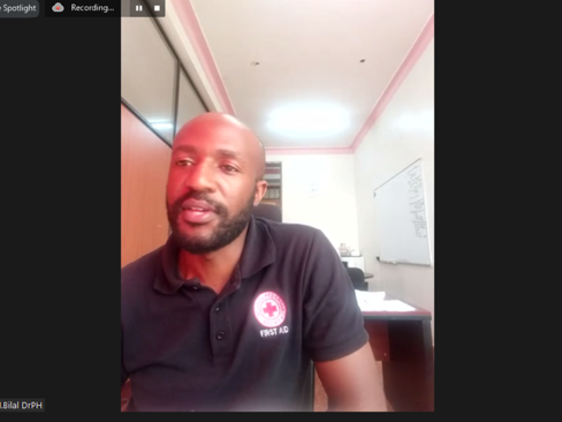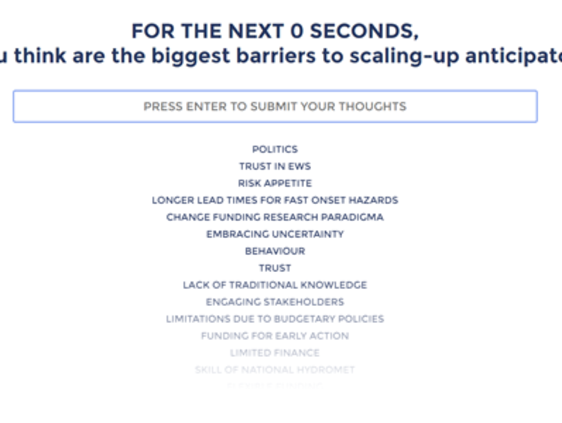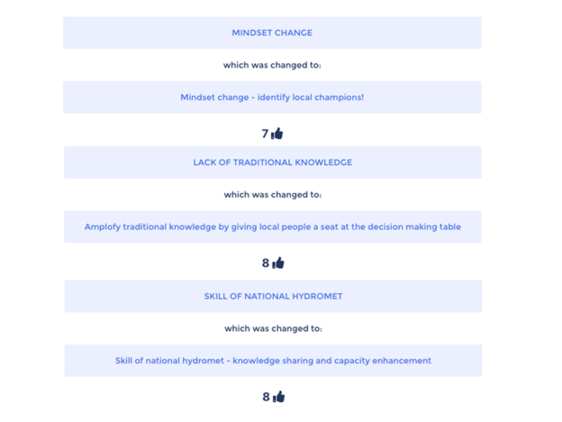Categories
What scale up? Disentangling the institutional enablers & barriers for early action
Early action offers an opportunity to break down the silos between the humanitarian, climate and development sectors. On 10 November 2021, at a Development and Climate Days session organised by the Anticipation Hub and the Red Cross Red Crescent Climate Centre, humanitarian actors, governments, donors and others came together to disentangle the institutional barriers and enablers for scaling up early action.
To set the scene, Animesh Kumar, Head of the UNDRR Bonn office, framed the importance of creating an enabling policy context for integrating anticipatory action within climate change adaptation, disaster risk reduction and development policies, laws and programmes to build long-term resilience. As an example, UNDRR is supporting the Risk-informed Early Action Partnership Target 1 working group to help governments embed a comprehensive risk management approach.
Next, John Harding, Head of Climate Risk and Early Warning Systems (CREWS) Secretariat at the World Meteorological Organization, highlighted the power of partnerships and emphasised how humanitarian actors can closely align their efforts with national meteorological and hydrological services to strengthen these services’ capacity to deliver national climate and weather forecasts that trigger early action at scale.
Sharing country and regional experiences
The diverse lineup of speakers continued, with representatives from governments, regional organisations and humanitarian agencies sharing their experiences of the barriers and enablers for scaling up early action. These case studies came from Bangladesh, Dominican Republic, Fiji, Malawi and the Association of South East Asian Nations (ASEAN) region; the resources shared by the speakers can be accessed via our padlet.
View resources shared by the speakers hereAhmadul Haque explained how the Bangladeshi government has included forecast-based action (FbA) in the national Standing Orders on Disasters and in the five-year National Plan for Disaster Management. An FbA technical working group is coordinating these multistakeholder efforts, but to scale up and reach the ‘last metre’ he emphasised that more awareness-raising and resources are needed at the local level.
“We’re always talking about reaching the last mile - but we should be reaching the last metre.”
Ahmadul Haque, Deputy Secretary, Director, Cyclone Preparedness Programme, Ministry of Disaster Management and Relief, Bangladesh
Next, Lucy Mtilatila highlighted the development of a National Framework for Climate Services in Malawi, and the growing demand for area- and sector-specific impact-based forecasts. She emphasised how more work is needed to connect with users on the ground, for example to make information accessible and understandable to them, and to continuously collect their feedback to improve early warnings and early actions.
“Participation and interaction makes information more impact based.”
Lucy Mtilatila, Deputy Director of the Department of Climate Change and Meteorological Services, Malawi
Dr Brian Kanaahe noted the importance of Uganda’s national-level technical working group on forecast-based financing, which helps to build awareness of early action and facilitate coordination with all actors. For scaling up, he highlighted the need for data to have a ‘human face’, calling for more impact-based forecasts that are meaningful for communities. At the same time, he cautioned that we can become over-reliant on data and technology and forget about the people on the ground.
“Unless we focus on ‘the human touch’, we depend on screens and forget what’s happening on the ground.”
Dr Brian Kanaahe, Director, Disaster Risk Management, Uganda Red Cross
Urbe Secades shared experiences in the Dominican Republic, where the World Food Programme supported government coordination around social protection and early action. Shock-responsive social protection has been just institutionalised by a decree law from the president, and anticipatory action is currently being integrated into government policy-making and operations. For scaling up, she talked about the need to improve the accuracy and localisation of forecasts with longer lead-times, to stimulate more flexible financing, and to continue the collaborative process with different actors to capture synergies.
“The national emergency response entity [in the Dominican Republic] now requests the social protection targeting unit and the forecasting entities to pre-target the areas and households likely to be impacted five days before the event.”
Urbe Secades, Programme Manager, World Food Programme
Mesake Mataitoga outlined how the Fiji Red Cross supported the government in their review of the disaster law, including the formulation of a technical working group and extensive inclusive consultations. In terms of scaling up, it is important to work together to break down silos and share responsibilities. Equally, there is a need to facilitate a people-centred approach that marries traditional and modern technology, and overcome communication challenges to reach isolated island communities.
“Leadership from the government is key.”
Mesake Mataitoga, Senior Disaster Risk Reduction Officer, National Disaster Management Office, Fiji
LA Dimailig shared the experience of integrating anticipatory action into the ASEAN agreement on disaster management and response (AADMER) work programme. To implement the programme and scale-up early action, he explained how it needs to be tailored to country-specific settings, and through a participatory approach involving all stakeholders.
“While integrating is already a big win, we still have more work to do in terms of [AADMER] implementation; all stakeholders are needed in transforming the concept into a list of actions.”
LA Dimailig, Assistant Director for Disaster Monitoring & Analysis, AHA Centre
Disentangling barriers and enablers for scaling up
To foster a space for constructive discussions, all participants were asked at the beginning of the session to share their thoughts about what scaling up early action meant to them. Responses highlighted the importance of leaving no one behind, the moral duty to act, and the need to work differently and together to institutionalise early action, reduce humanitarian needs, bridge preparedness and response, and build resilience.
Participants and speakers were then asked to come together in a ‘serious game’ developed by GoodGames with the Climate Centre, in which they listed and ‘RANTED’ about perceived barriers for scaling up anticipatory action. After hearing from all the speakers, participants were then asked to edit the barriers identified earlier by drawing inspiration from the presentations, and find ways to overcome these barriers from the case studies. Below are some of the key barriers and enablers identified during this exercise.
BARRIERS
- Sectoral silos
- Fragmentation of financing
- Limited technical capacity and skills of national meteorological and hydrological services
- Lack of convincing evidence
- Political willingness and bureaucratic hurdles
- Behaviour and culture change within institutions
ENABLERS
- Multistakeholder coordination and partnership
- Impact-based forecasts (sector-specific, localised, longer lead times, wider coverage)
- Two-way interaction with users and communities (inclusive approach)
- Coherent/innovative financing mechanisms (flexible, predictable, diversified, locally led)
- Capacity building, training and knowledge-sharing (communities, government institutions)
- Integrating traditional/indigenous knowledge with modern science
- Leadership and local champions
Scaling up - where do we go from here?
To wrap up the session, Nora Guerten from the Food and Agriculture Organization and representing the Anticipatory Action Task Force, joined Matthias Amling from the German Federal Foreign Office to reflect on the barriers and enablers identified and how this can be taken forward. Drawing on themes from the speakers, Nora identified the need to continue to build more common frameworks and guidelines across humanitarian, climate and development actors, link to existing and new climate services networks, and make sure everyone is involved. Matthias reiterated that it is our moral duty to work together to break down silos and build bridges to ensure early warnings enable early action at the ‘last metre’.
Overall, it is clear that scaling up early action cannot be achieved without strong partnerships, learning and coordination between practitioners and government actors across the climate and development sectors. Only by doing this can we create a systemic shift to act ahead of disasters.

“Speakers at the D&C days session: What scale up? Disentangling the institutional enablers & barriers for early action”

Dr. Brian Kanaahe, Director Disaster Risk Management, Uganda Red Cross

Insights from the interactive game disentangling barriers and enablers.


“Speakers at the D&C days session: What scale up? Disentangling the institutional enablers & barriers for early action”
Dr. Brian Kanaahe, Director Disaster Risk Management, Uganda Red Cross
Insights from the interactive game disentangling barriers and enablers.
